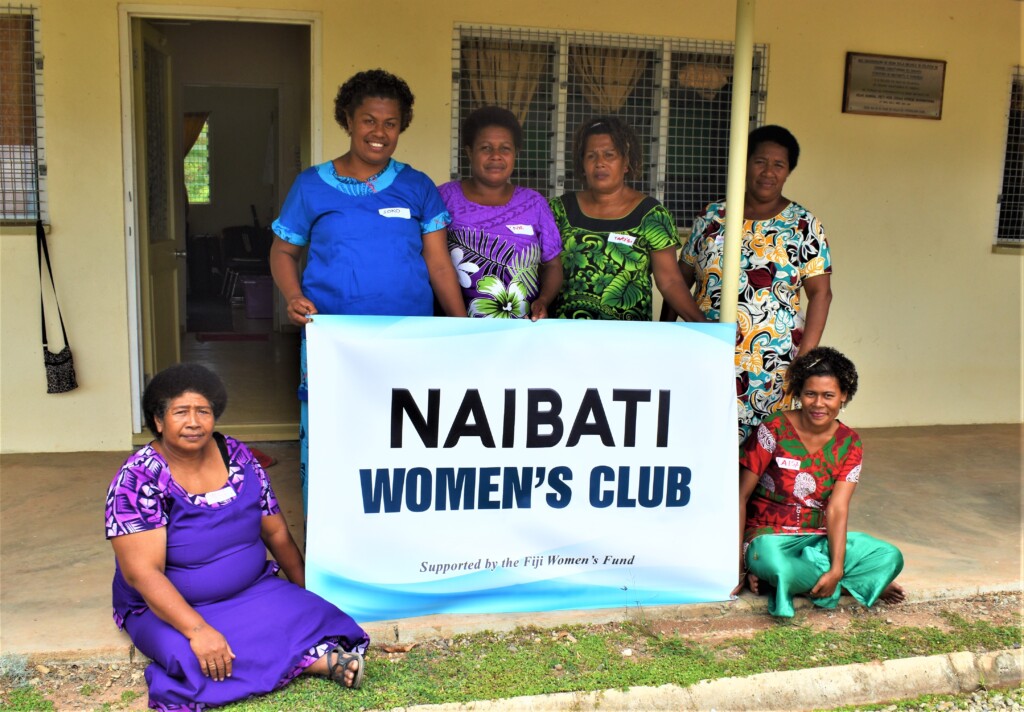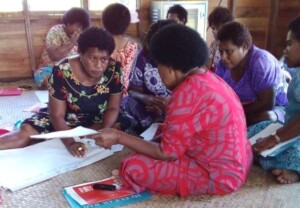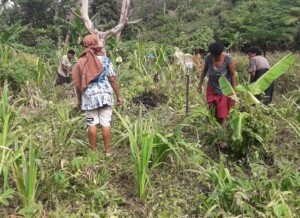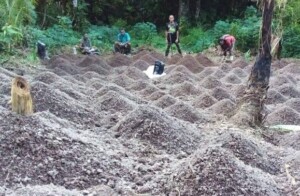Women’s grant ignites entrepreneurial journey for women’s group in Kadavu
October 29, 2021

By Devina Devi and Erica Lee
Nestled in the hills of Tavuki District on the Island of Kadavu, is Waisomo village, home to Naibati Women’s Club (also known as Waisomo’s Women’s Group). The club was formed in January 2000 to create economic opportunities for its 20 members.
Under the guidance and support of their village development committee advisor, in 2020, the club secured a grant of FJD 17,000 from Women’s Fund Fiji. The grant was used for a transformation project aimed at developing and enhancing the leadership, agency and financial literacy of its members, to strengthen club governance and develop agriculture-based livelihood programmes. The women were also adamant that their activities should include awareness on disaster preparedness having recently recovered from the devastating impact of Category 5 tropical cyclone Harold earlier in the year.
For transparency and to garner support and the blessings of the village elders and leaders, the women presented the details of their project to the ‘Bose Vakoro’ (leaders meeting). The women received overwhelming support and their transformation project was also aligned and embedded into the village’s 20-year development plans to ensure long-term sustainability.
“The lives of women in a communal village setting are interwoven with that of traditional roles, cultural expectations, and practices such as “solesolevaki” (shared workload and equity). We were mindful to ensure that we gained the support of our whole village for prosperity and collaboration purposes,” said Mrs. Merelita Waqa, President of the group.
Kicking off their entrepreneurial journey

In February 2021, the club whose membership has grown to 30 members, participated in financial literacy and financial management training aimed at supporting small businesses and entrepreneurial skills development.
The Training was conducted by Merewalesi Wavu from the I-taukei Affairs Board based in Suva. The women were introduced to leadership styles, governance principles, strategic planning, introduced to financial literacy, financial inclusion, understanding source documents, financial guidelines, understanding procurement and payment processes, how to start a business, cash flow, saving and investing income, creating financial statements, marketing, quality assurance and customer satisfaction.
Following the training, the club developed an action plan to establish yam and voivoi (pandanus leaves used for weaving) plantations with the support of Agriculture Officers based in Kadavu. The club incorporated the advice and knowledge from communities of the practice such as traditional planting techniques and using climate-resilient crops which aligned well with their climate change adaptation, food security and longer-term sustainable income plans.
The women purchased 500kg of yam seeds and were supported by the men of the village to plant them. The yams will be harvested around cyclone season next year and will be crucial for food security given that they are a crop that can be stored for a long period of time. Any extra produce will be sold and income made will be shared between the members of the club and a portion deposited into their new savings account.
Each member committed to planting 200 voivoi plants and today the club has a thriving large-scale voivoi plantation. In the past, whenever the women ran out of stock of voivoi; it was common practice to barter with relatives in nearby villages. In doing so, the women lost a portion of their handicraft sales profits as they would have to present a 20-litre drum of kerosene (FJD 40.00) and cover the cost of transportation (around FJD 100 depending on the location of the village) in exchange for the voivoi.
In August the club also achieved another milestone when they opened a canteen in the village. The canteen is operated by members of the group and sells basic food items such as flour, rice, sugar, salt, milk, oil and canned meat. These items previously could only be purchased in neighbouring villages or at the main urban centre – Vunisea which is a costly travelling distance from the village.


Opening their first group bank account
Inspired by the financial literacy training and now with their income-generating projects fully set up, the women then turned their attention to opening savings accounts where they could safely keep and invest their money.
With there being no commercial banks in Kadavu, three trustees of the club travelled to Suva in October to open the bank accounts. This however was no easy task as many of the women lacked the formal identification required by financial institutions. The club had to obtain copies of their birth certificates and voter registration cards. It took them two months to collate all the documents required by the bank. Despite these challenges, the club managed to open a cheque account with the Bank of the South Pacific and an investment account with Unit Trust of Fiji (UTOF). Eight of their 30 members also now have bank accounts. The club will continue to work on getting formal identification for other members who want to open savings accounts.
“When the women opened those accounts, we felt like this was the beginning of many positive transformations and a truly life-changing experience to come for members of the Naibati Women’s Club,” shared Iliesa Marawa, a village elder.
On a monthly basis, the club collects income (around FJD 500) from the canteen and handicraft sales and takes it Vunisea to deposit it at the Post Office – the official outlet for UTOF.
COVID-19 impact on women in Waisomo
Amid activity implementation, Kadavu went into lockdown due to COVID-19 cases detected on the island. Movement restrictions, limited resources and transportation meant that the women faced reduced incomes. The club reached out to WFF requesting a change to their workplan activities and to use the remainder of project funds to purchase food rations for members.
On a positive note, the group’s canteen experienced an increase in sales because villagers were restricted from leaving containment zones. The women have also attributed the difficulties of this year to their increased use in technology such as social media and online platforms like zoom. This has allowed them to connect with family, access information, market and sell their handicrafts, and also build connections with new partners that will benefit the club long-term.
They have also forged new partnerships with Medical Services Pacific (MSP) which conducted sexual reproductive health rights outreach in their village and received a donation of 600 face masks from the Rotary Club of Suva East. These masks were shared with neighbouring villages and a portion has been kept for students returning to school.
Alongside these exciting activities, the club has noticed a renewed sense of interest and pride in maintaining traditional weaving. Older women in the village have started programmes aimed at teaching weaving skills to young women who can use these new skills to earn a living.
While the grant has now been fully utilised, the women have their sights on addressing the high rates of violence against women, furthering the work they have started on climate adaptation and are also looking at new opportunities to diversify their sources of income. The club is currently in talks with the Red Cross to host a climate adaption and disaster preparedness workshop in Waisomo Village so that their whole community is part of the workshop.
“The grant ignited a passion in our members, and we feel fortunate that WFF believed in us. The grant also paved the way for many wonderful milestones for our club that we could not have done without the support of the Australian Government through WFF,” said Mrs. Waqa.
Recent Whats New
WFF Visit to “Rise Beyond the Reef”
December 12 2023
LifeBread Confident Woman Program Graduation
December 12 2023
